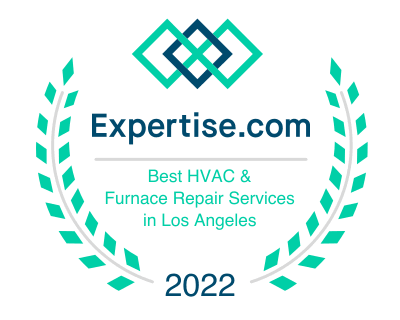If you’ve been considering installing a MERV 16 filter or have been told by an HVAC professional that you should, you’re probably wondering if it’s worth the cost.
In our opinion, MERV 16 filters are a great option for keeping your home’s air quality high and are recommended by the EPA.
That being said, you probably have questions about what the benefits of a MERV 16 filter are, so below, we’ll explain what MERV stands for, and why we suggest MERV 16 filters for Los Angeles homeowners.
What does MERV stand for?
MERV stands for Minimum Efficiency Reporting Value and is a measurement scale that indicates how effective an AC filter is. Residential AC filters range from MERV 1-16.
The higher the MERV rating, the higher the percentage of airborne particles a filter can successfully catch. All filters are tested for how well they catch particles based on the size of the particle.
The three size categories of particles include:
-
E1: 0.3 to 1.0 micrometers
-
E2: 1.0 to 3.0 micrometers
-
E3: 3.0 to 10.0 micrometers
As a reference for exactly how big a micrometer (µm) is, a strand of human hair is 20 µm in diameter.
To summarize, the higher the MERV rating, the smaller (and more) airborne particles the filter can catch, making it more effective.
Now that we’ve covered what MERV ratings mean, let’s meet our contender for the best MERV rating.
Why is MERV 11 the ideal filter rating?
MERV 11 filters are ideal because they are effective at catching small particles, while still allowing enough air to pass through the filter.
Using the size categories above, a MERV 11 filter can successfully catch65% of E2 particles (1.0 – 3.0 µm) and 85% of E3 particles (3.0 – 10.0 µm). Since they can catch bacteria, mold, and fungi, MERV 11 filters can prevent contaminants from circulating in your home’s air.
MERV 11 filters are especially useful if your household has …
-
Allergy sufferers: MERV 11 filters can trap pet dander, pollen, dust, and mold.
-
Heavy smokers: If your home is full of smoke, MERV 11 filters can catch the particles to help you breathe easier.
-
Elderly people (65+ years old) or young children (5 years old or below) with respiratory problems: If you live in a metropolitan area and experience heavy pollution that might irritate your lungs, MERV 11 filters can help improve your indoor air quality.
Should you buy a MERV 11 or 16 filter?
You might be wondering why we are suggesting a MERV 11 filter instead of a higher filter like a 14 or 16.
Generally speaking, it’s not recommended to go above an 11 MERV rating. The higher the MERV rating, the more tightly woven the filter is, which makes it difficult for air to pass through. If your AC doesn’t get enough airflow, it can cause something called a pressure drop, which can lead to high AC bills and AC damage.
What exactly are pressure drops? They occur when air is slow to enter your AC system and they can lead to:
-
Increased AC bills: If your AC can’t circulate enough air, your AC will have to work longer to produce the same amount of cooled air. Over time, this increased energy use means increased monthly utility bills.
-
AC Damage: Lack of airflow can cause your AC coils to freeze, which can damage your AC compressor. If your compressor becomes damaged, you could be looking at an expensive repair.
All-in-all, we recommend MERV 11 filters because they are effective at filtering out fine particles, but also allow sufficient airflow to your AC system.










